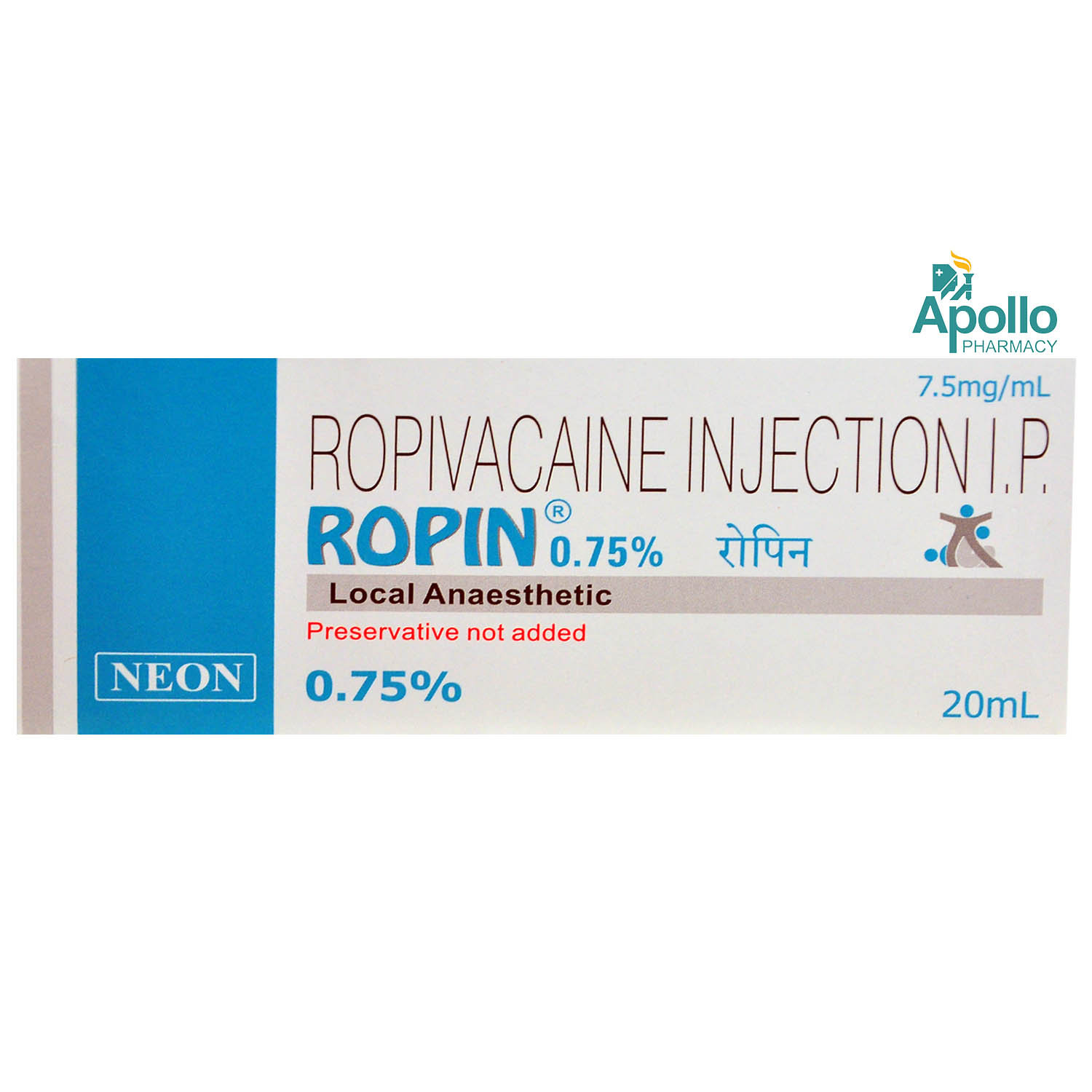Ropivacaine Hydrochloride
About Ropivacaine Hydrochloride
Ropivacaine Hydrochloride belongs to the class of local anaesthetic medications. It is indicated in adults for producing local or regional anaesthesia for surgery and acute pain management. Anesthesia is a medical procedure that prevents pain and discomfort during surgical or medical procedures. Pain is a symptom triggered by the nervous system, which causes uncomfortable sensations in the body. The tolerance level of pain might vary from person to person.
Ropivacaine Hydrochloride contains Ropivacaine Hydrochloride. It works by blocking the transmission of pain signals from the nerves to the brain.
Ropivacaine Hydrochloride is administered only in a hospital setting by an anaesthetist. It may occasionally cause undesirable effects during the medical procedure like hypotension, nausea, vomiting, bradycardia (slow heart rate), fever, pain, postoperative complications, anaemia, paresthesia (Pins and needles), headache, pruritus (itching), and back pain. Any problems that arise during your procedure will be promptly addressed by your anaesthetist.
Ropivacaine Hydrochloride is recommended not to use if you are hypersensitive to Ropivacaine Hydrochloride or other similar anaesthetics. So, before taking Ropivacaine Hydrochloride, let your doctor know about all your medical conditions, sensitivities, and all medications you are using. Also, let your doctor know if you are pregnant or breastfeeding. The safety and efficacy of ropivacaine in pediatric patients have not been established. Patients should not drive or operate heavy machinery for at least 24 hours after receiving Ropivacaine Hydrochloride.
Uses of Ropivacaine Hydrochloride
Medicinal Benefits
Ropivacaine Hydrochloride contains Ropivacaine Hydrochloride, which belongs to the anaesthetics class used for surgical anaesthesia. It is indicated in adults to produce local or regional anaesthesia for surgery and acute pain management. It works by blocking the transmission of pain signals from the nerves to the brain. This helps to decrease the sensation of pain.
Directions for Use
Storage
Side Effects of Ropivacaine Hydrochloride
- Hypotension
- Nausea
- Vomiting
- Bradycardia (slow heart rate)
- Fever
- Pain
- Postoperative complications
- Anemia
- Paresthesia (burning and pinning sensation)
- Headache
- Pruritus (itching)
- Back pain
Drug Warnings
Ropivacaine Hydrochloride is not recommended in individuals with known hypersensitivity to ropivacaine or other amide-type local anaesthetic medication. So, tell your doctor about your medical conditions, sensitivities, and prescriptions. Inform your doctor if you are pregnant or breastfeeding. Ropivacaine's safety and efficacy in pediatric patients have not been established. After receiving Ropivacaine Hydrochloride, patients should not drive or operate heavy machinery for at least 24 hours. Ropivacaine Hydrochloride may cause cardiac arrhythmia or cardiac arrest in some patients. Hence, careful monitoring is recommended during the treatment.
Drug Interactions
Drug-Drug Interactions: Ropivacaine Hydrochloride may interact with anti-mycobacterial agents (aminosalicylic acid), antimalarials (chloroquine), antibiotics (dapsone), antineoplastic (ifosfamide), vasodilatory drugs (nitroglycerin), etc.
Drug-Food Interactions: Alcohol consumption should be avoided.
Drug-Disease Interactions: No interactions found or established.
Drug-Drug Interactions Checker List:
Safety Advice

Alcohol
cautionYou are recommended to avoid alcohol consumption with Ropivacaine Hydrochloride.

Pregnancy
cautionInform your doctor before receiving the Ropivacaine Hydrochloride if you are pregnant or planning to be pregnant. Your doctor will prescribe only if clinically needed if the benefits outweigh the risks.

Breast Feeding
cautionRopivacaine Hydrochloride may be excreted into the breast milk. Your doctor may suggest you stop breastfeeding for a certain period.

Driving
unsafePatients should not drive or operate heavy machinery for at least 24 hours after receiving Ropivacaine Hydrochloride.

Liver
cautionSince the liver metabolizes amide-type local anaesthetics like ropivacaine, patients with liver disease should use Ropivacaine Hydrochloride with caution, especially if they are taking repeat doses. Individuals with severe liver disease are more likely to experience toxic plasma concentrations due to their impaired ability to metabolize local anaesthetics.

Kidney
cautionSince the kidneys are known to excrete this medication and its metabolites, patients with impaired renal function may be more vulnerable to toxic reactions from Ropivacaine Hydrochloride. Inform your doctor if you have kidney problems.

Children
cautionThe safety and efficacy of ropivacaine hydrochloride in pediatric patients have not been established.
Habit Forming
Patients Concern
Disease/Condition Glossary
Pain: It is not a disease but a symptom triggered by the nervous system, causing uncomfortable sensations in the body. Pain can be generalized (overall body aches) or localized (affecting a specific body area). The tolerance level of pain might vary from person to person. Pain can be considered a good thing as it helps us know something is wrong in the body and helps diagnose the condition. The common causes of pain include headache, muscle strain, cramps, cuts, bone fractures, arthritis and stomach aches.
FAQs
Ropivacaine Hydrochloride contains Ropivacaine Hydrochloride. It works by blocking the transmission of pain signals from the nerves to the brain.
Ropivacaine Hydrochloride may affect your heart rhythm. Disturbances of the heart rhythm are very common. Your anaesthetist will quickly deal with any problems that arise during your operation.









